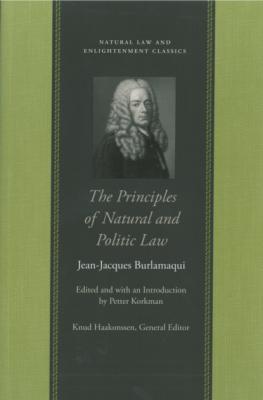The Principles of Natural and Politic Law. Jean-Jacques Burlamaqui
Читать онлайн.| Название | The Principles of Natural and Politic Law |
|---|---|
| Автор произведения | Jean-Jacques Burlamaqui |
| Жанр | Философия |
| Серия | Natural Law and Enlightenment Classics |
| Издательство | Философия |
| Год выпуска | 0 |
| isbn | 9781614871835 |
Sect. 6. Antecedent and subsequent conscience. Fourth rule.
Sect. 7. Subsequent conscience is either quiet, or uneasy.
Sect. 8. Decisive and dubious conscience. Fifth, sixth, and seventh rule.
Sect. 9. Scrupulous conscience. Eighth rule.
Sect. 10. Right and erroneous conscience. Ninth rule.
Sect. 11. Demonstrative and probable conscience. Tenth rule.
CHAPTER X
Of the merit and demerit of human actions; and of their imputation relative to the laws of nature.
Sect. 1. Distinction of imputability and imputation. Of the nature of a moral cause.
Sect. 2. Of the nature of imputation. It supposes a knowledge of the law as well as of the fact.
Sect. 3. Examples.
Sect. 4. Principles. 1. We ought not to infer actual imputation from imputability only.
Sect. 5. 2. Imputation supposes some connexion between the action and its consequences.
Sect. 6. 3. Foundation of merit and demerit.
Sect. 7. In what merit and demerit consists.
Sect. 8. 4.Merit and demerit have their degrees; and so has imputation.
Sect. 9. 5.Imputation is either simple or efficacious.
Sect. 10. 6. Effects of one and the other.
Sect. 11. 7. If those who are concerned, do not impute an action, it is supposed not to have been committed.
Sect. 12. 8. Difference between the imputation of good and bad actions.
CHAPTER XI
Application of those principles to different species of actions, in order to judge in what manner they ought to be imputed.
Sect. 1. What actions are actually imputed?
2. Actions of such as have not the use of reason.
3. Of what’s done in drunkenness.
Sect. 2. Of things impossible. Of the want of opportunity.
Sect. 3. Of natural qualities. Of events produced by external causes.
Sect. 4. Of what is done through ignorance or error.
Sect. 5. Of the effect of temperament, habits, or passions.
Sect. 6. Of forced actions.
Sect. 7. Forced actions are in themselves either good, bad, or indifferent.
Sect. 8. Why a bad action, though forced, may be imputed.
Sect. 9. Puffendorf’s opinion.
Sect. 10. Of actions in which more persons than one are concerned.
Sect. 11. Three sorts of moral causes; principal; subaltern; and collateral.
Sect. 12. [Section number is missing in Nugent text.]
Sect. 13. [Section number is missing in Nugent text.]
Sect. 14. [Section number is missing in Nugent text.]
Sect. 15. Application of these distinctions.
CHAPTER XII
Of the authority and sanction of natural laws: and 1. of the good and evil that naturally and generally follow from virtue and vice.
Sect. 1. What is meant by the authority of natural laws.
Sect. 2. The observance of natural laws forms the happiness of man and society.
Sect. 3. Explications on the state of the question.
Sect. 4. Proof of the abovementioned truth, by reason.
Sect. 5. Proofs by experience. 1. Virtue is of itself the principle of inward satisfaction; and vice a principle of disquiet and trouble.
Sect. 6. Of external goods and evils, which are the consequence of virtue and vice.
Sect. 7. These different effects of virtue and vice are still greater among those who are invested with power and authority.
Sect. 8. Confirmation of this truth by the confession of all nations.
Sect. 9. Confirmation of the same truth by the absurdity of the contrary.
Sect. 10. Answer to some particular objections.
Sect. 11. The advantage always ranges itself on the side of virtue; and this is the first sanction of the laws of nature.
Sect. 12. General difficulty drawn from the exceptions, which render this first sanction insufficient.
The goods and evils of nature and fortune are distributed unequally, and not according to each person’s merit.
The evils produced by injustice fall as well upon the innocent as the guilty.
Sometimes even virtue itself is the cause of persecution.
Sect. 13. The means which human prudence employs to remedy those disorders, are likewise insufficient.
Sect. 14. The difficulty proposed, is of great consequence.
CHAPTER XIII
Proofs of the immortality of the soul. That there is a sanction properly so called in respect to natural laws.
Sect. 1. State of the question.
Sect. 2. Division of opinions. How it is possible to know the will of God in respect to this point.
Sect. 3. Whether the soul is immortal? First proof. The nature of the soul seems intirely distinct from that of the body.
Sect. 4. Death does not therefore necessarily imply the annihilation of the soul.
Sect. 5. Objection. Answer.
Sect. 6. Confirmation of the preceding truth. Nothing in nature is annihilated.
Sect. 7. Second proof. The excellency of the soul.
Sect. 8. Confirmations. Our faculties are always susceptible of a greater degree of perfection.
Sect. 9. Objection. Answer.
Sect. 10. Third proof, drawn from our natural dispositions and desires.
Sect. 11. The sanction of natural laws will shew itself in a future life.
Sect. 12. First proof, drawn from the nature of man considered on the moral side.
Sect. 13. Second proof, drawn from the perfections of God.
Sect. 14. [Section number is missing in Nugent text.]
Sect. 15. The objection drawn from the present state of things serves to prove the sentiment it opposes.
Sect. 16. The belief of a future state has been received by all nations.
CHAPTER XIV
That the proofs we have alledged have such a probability and fitness, as renders them sufficient to fix our belief, and to determine our conduct.
Sect. 1. The proofs we have given of the sanction of natural laws are sufficient.
Sect. 2. Objection. These proofs contain no more than a probability or fitness. General answer.
Sect. 3. What is meant by a probability or fitness.
Sect. 4. General
